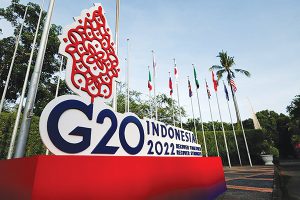BALI / WAM
The G20 health ministers have agreed to establish a pandemic fund. The fund will be commonly used to fix the health system and close the budget gap for the following five years, based on how the Covid-19 pandemic has been handled in the previous two years.
At the G20updates press conference, Secretary General of the Indonesian Ministry of Health Kunta Wibawa Dasa Nugraha stated that this agreement was the outcome of second Health Ministerial Meeting in October 2022 and would become agenda of discussions at the G20 Summit in Bali.
According to him, up to 20 donor countries and three philanthropists have expressed willingness to contribute to the effort to raise “pandemic fund†totaling $1.4 billion.
“The agreement is an excellent place to start because the fund discussion has already garnered such a significant commitment in just a few months. This ‘pandemic fund’ commitment is included in the agenda of the G20 leaders’ summit,†said Kunta.
He continued that the six main outcomes of the G20 health agenda may potentially be supported by this pandemic fund.
The agenda includes efforts to improve genetic surveillance, encourage the mobilisation of health resources for medical countermeasures, and expand research and manufacturing networks for vaccines, therapies, and diagnostics (VTD).
All nations are now aware of the need to improve the global health architecture because of the Covid-19 pandemic that has been sweeping the globe since the beginning of 2020. Kunta stressed that the pandemic has negative socio-economic impacts. Therefore, along with the issues of the sustainable energy transition, digital transformation, and economic issues, the issue of global health architecture is chosen as one of the priorities.
“This is significant because the WHO and the World Bank have projected a pandemic financing gap of around $10.5 billion over the following five years during the implementation of the high-level independent panel of the G20. To close this gap, contributing countries are expected to be able to balance the distribution of health services in times of emergencies,†he added.
Ministers are aware that the virus knows no border, Kunta added. Therefore, to create a more resilient health architecture in order to combat pandemics in the future, awareness and coordinated actions are required. Countries must work together if the globe is to be rid of the pandemic.
Indonesia’s G20 presidency promotes the importance of surveillance so that countries support the timely exchange of pathogen data on a reliable platform. However, Kunta emphasized that we not only encourage sharing of pathogens but also support benefit sharing, which is advantageous not only between countries but also for global and regional benefits.
 The Gulf Time Newspaper One of the finest business newspapers in the UAE brought to you by our professional writers and editors.
The Gulf Time Newspaper One of the finest business newspapers in the UAE brought to you by our professional writers and editors.
